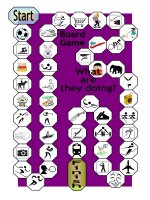What Are They Doing With a Bachelors Degree in Sociology?
Bạn đang xem bản rút gọn của tài liệu. Xem và tải ngay bản đầy đủ của tài liệu tại đây (373.54 KB, 10 trang )
What are they Doing with a
Bachelor’s Degree in Sociology?
DATA BRIEF ON CURRENT JOBS
R o b e r t a S p a l t e r- R o t h a n d N i c o l e Va n Vo o r e n
January 2008
In
AY 2005 the American Sociological
Association’s Research and Development
Department surveyed a sample of close to 1,800
seniors to find out their satisfaction with the
sociology major and their future plans for work,
graduate school, or both. Early in 2007 we resurveyed the class of 2005 to find out what they
were doing with their bachelor’s degree since
graduation.1 This Data Brief, the first in a series
of downloadable publications from the second
wave of the survey, provides information on the
post-graduate activities of graduates, the kinds of
jobs they held as of December 2006, their
satisfaction with these jobs, and the changes in
their overall satisfaction with the sociology major.
Figure 1 compares the 2005 responses of
senior majors as to their future plans with their
2007 reports as to what they actually were doing.
The figure shows that in 2005, 40 percent of
respondents planned to work and not attend
graduate school after they obtained their
_________________________________________________
1The response rate for the second wave of the survey was 44
percent or 778 graduates.
FIGURE 1: MORE SOCIOLOGY BACHELOR’S RECEPIENTS ARE WORKING,
PLANS FOR THE FUTURE AT TIME 1 VS. STATUS AT TIME 2
(in Percents)
42.1
Job Only
60.3
22.2
Grad School Only
13.1
26.9
Both
22.0
Wave 1
Wave 2
8.8
Neither
4.7
0
10
20
30
40
50
60
Source: ASA Research and Development Department, What Can I Do With a Bachelor's Degree in Sociology? Wave I and Wave II
A M E R I C A N S O C I O L O G I C A L A S S O C I AT I O N - D E PA RT M E N T O F R E S E A RC H A N D D E V E L O P M E N T
WHAT ARE THEY DOING WITH A BACHELOR’S DEGREE IN SOCIOLOGY?
baccalaureate degree. By 2007, nearly 60 percent
reported working and not attending graduate
school, a 30 percent increase from their pregraduation plans. While 20 percent of seniors
planned on exclusively attending graduate school
(primarily for education, criminology and
sociology), just over 10 percent were enrolled in
a graduate program in December 2006 (a few
reported having completed a graduate program).
The percentage of those who planned to both
work and attend graduate school simultaneously
decreased slightly. Since the overwhelming
majority of 2005 sociology majors are working
exclusively or while in graduate school, we turn
to the type of jobs they held, their satisfaction
with these jobs, and their overall satisfaction
with the sociology major one and a half to two
years after graduating.
OCCUPATIONAL BREAKDOWN
Table 1 shows the occupations in which
these recent graduates were employed, based on
their own self-categorization. The table
compares those who held full-time jobs, those
who held part-time jobs, and those who held
internships (the latter two categories were more
likely to be in graduate school than those with
full-time jobs). About one-quarter of the fulltime workers were employed in social service
and counseling occupations, most likely in nonprofit organizations. As can be seen from the list
of specific job descriptions in Appendix 1 Table
2, graduates deal with social problems that they
explored as part of their sociology major. They
2
About two-thirds of those
who said their jobs were
closely related to what they
had learned as sociology
majors were very satisfied
with their jobs.
provided services for victims of abuse and illfortune including neglected children, battered
women, adolescents involved in the juvenile
justice system, food-stamp and Medicaid eligible
families, poor families in need of energy
assistance, and disaster victims.
The next largest job categories of full-time
workers provided administrative support and
management skills in a wide variety of
organizations. These sociology graduates are
most likely to be employed in for-profit
organizations or in state or local government.
The administrative support workers manage or
assist in the running of on-site information
technology systems such as troubleshooting a
variety of issues that popup with computers,
printers, and Blackberries. They are employed
to run office accounting systems, client filing
systems, and employee training. Those classifying
themselves as managers work in human resource
departments recruiting, staffing, and training
company employees. For example, one graduate
worked as a resource coordinator for the Federal
A M E R I C A N S O C I O L O G I C A L A S S O C I AT I O N
DATA BRIEF ON CURRENT JOBS
TABLE 1: OCCUPATIONAL CATEGORIES OF SOCIOLOGY BACCALAUREATES BY JOB STATUS
OCCUPATION
PART-TIME
FULL TIME
(>35 Hours)
(35 hours or more)
54.8%
17.5%
26.5%
Clerical/administrative support
4.8%
12.5%
15.8%
Management
2.4%
5.8%
14.4%
Teachers, Librarians
4.8%
18.3%
8.1%
Services
0%
18.3%
8.3%
Sales, Marketing
0%
10.8%
10.1%
23.8%
12.5%
5.7%
Others
7.1%
2.5%
4.4%
Other Professionals (includes PR and IT)
2.4%
1.7%
6.8%
TOTAL
100%
100%
100%
Social Services, Counselors, Psychologists
Social Science, Researchers
INTERNSHIP
Source: ASA Research and Development Department, What Can I Do With a Bachelor's Degree in Sociology? Wave I and Wave II
Emergency Management Agency. Typical job
descriptions include providing financial analysis,
workforce planning, quality assurance, and
employee evaluation.
A smaller percentage of full-time workers are
employed in sales and marketing for information
technology hardware and software firms. They
design and execute marketing plans, do marketing
research, run capital campaigns, and write
creative copy. Additional occupations of fulltime workers include teachers and librarians
employed in the education sector, and as police
officers, crime scene investigators and parole
officers in the criminal justice system. One
member of the class of 2005 was employed in a
food service occupation as a pastry chef.
Among the smallest full-time occupational
category are those employed as social science
researchers, suggesting that 2005 graduates did
not receive enough training in research methods,
computer applications, and statistics as part of
their undergraduate major to obtain positions in
the science workforce.
To compensate for this lack of training some
members of the class of 2005 went on to graduate
school and obtained internships as social science
researchers (almost one-quarter of those interns
were in training to learn additional social
science and research skills). Still, more than half
of all interns were employed in social service
and counseling occupations, perhaps reflecting a
goal stated in 2005 to bring about change by
addressing social problems (see What Can I Do
with a Bachelor’s Degree in Sociology? Phase 1
/>ASAChartBook_0117w1.pdf).
DEPARTMENT OF RESEARCH AND DEVELOPMENT
3
WHAT ARE THEY DOING WITH A BACHELOR’S DEGREE IN SOCIOLOGY?
Part-time workers (categorized as those
working fewer than 35 hours per week) were
more likely than full-time workers or interns to
be employed in a wide array of jobs such as
teachers or librarians, service workers, social
service workers, social science researchers,
administrative support positions, and sales and
marketing positions. Almost half of those who
worked part time while also attending graduate
school were found in either service positions or
as social science researchers.
that their jobs were not closely related to their
sociology degree. Respondents noted that there
were few jobs labeled “sociologist” and that they
had not been helped by career counselors at their
schools to know for what jobs sociology majors
qualified and what skills they should emphasize
in their job search (less than 20 percent of
sociology majors reported in 2005 that they were
very satisfied with career counseling). Figure 2
shows that former majors were likely to be more
satisfied with jobs that allowed them to employ
sociological concepts, theories or paradigms that
provided an understanding of social problems
and social structure. Almost 70 percent of those
who reported that their jobs were closely related
to what they had learned as sociology majors were
very satisfied with their jobs. Only about half of
those who described their jobs as somewhat
JOB SATISFACTION
About half of the 2005 class were very
satisfied with the jobs they held in 2007 and
another 42 percent were somewhat satisfied.
However, a majority of graduates also reported
FIGURE 2: OVERALL SATISFACTION WITH THE SOCIOLOGY MAJOR BY RELATION TO JOB
(in Percents)
Closely
Related
Somewhat
Related
67.7
29.0
3.2
53.6
42.3
4.1
36.4
Not
Related
Very Satisfied
Somewhat Satisfied
Dissatisfied
50.3
13.4
0
10
20
30
40
50
60
70
80
Source: ASA Research and Development Department, What Can I Do With a Bachelor's Degree in Sociology? Wave I and Wave II
*For each level of relation to job, the satisfaction measures add to 100%.
4
A M E R I C A N S O C I O L O G I C A L A S S O C I AT I O N
DATA BRIEF ON CURRENT JOBS
FIGURE 3: SATISFACTION WITH THE SOCIOLOGY MAJOR AS A SENIOR AND A 1-2 YEARS LATER
(in Percents)
71.6
Very
Satisfied
52.2
Somewhat
Satisfied
27.4
41.0
Not at all
Satisfied
1.0
Wave 1
Wave 2
6.0
0
10
20
30
40
50
60
70
80
Source: ASA Research and Development Department, What Can I Do With a Bachelor's Degree in Sociology? Wave I and Wave II
*In Wave II there was a category, “Somewhat Dissatisfied” that is included in “Not at all Satisfied” in this figure
related to what they had learned as sociology
majors were very satisfied with their jobs. In
contrast only about 35 percent of those who
reported that their jobs were not related to
sociology were very satisfied with these jobs.
OVERALL SATISFACTION WITH
THE SOCIOLOGY MAJOR
In 2005 more than three quarters of majors
said that they were very satisfied with their
choice of sociology as a major. Figure 3 shows
that as of 2007 respondents who were very
satisfied declined to less than 60 percent. We
suggest that a major reason for the decline is
the percent of respondents who had not found
jobs that employed the concepts, theories, and
methods that they had learned as undergraduates.
Figure 4 shows that those enrolled in
graduate school alone were the group most
satisfied with majoring in sociology while those
employed but not in graduate schools are
substantially less happy with their sociology
major than when they were seniors in college.
Not surprisingly, those who were neither
employed nor attending graduate school during
the survey week were the least satisfied with
their choice of the sociology major.
CONCLUSIONS
Since almost 60 percent of sociology
baccalaureates are working and another 20
percent are working and going to graduate
school, majors need to be counseled as to the
kinds of jobs that they can reasonably expect to
DEPARTMENT OF RESEARCH AND DEVELOPMENT
5
WHAT ARE THEY DOING WITH A BACHELOR’S DEGREE IN SOCIOLOGY?
FIGURE 4: STILL VERY SATISFIED WITH SOCIOLOGY MAJOR BY CURRENT STATUS
(in Percents)
Employed
Only
Very
Satisfied
51.1
Enrolled in School
Somewhat
Satisfied
Both
65.3
52.5
Not at all
Neither
Satisfied
23.6
00
10
10
20
20
30
30
40
40
50
50
60
60
70
70
80
80
Source: ASA Research and Development Department, What Can I Do With a Bachelor's Degree in Sociology? Wave I and Wave II
*Will not equal to 100% because only “Very Satisfied” are included
obtain (especially without methodological
skills) and the skills they need to list on their
resumes. To increase the likelihood that majors
obtain employment that is closely related to
their major, it is especially important that
faculty provide students with access to local
labor market data, such as the regional data
6
and contacts provided by the Bureau of Labor
Statistics ( />and />This may be especially important if career
counseling offices are not aware of the skills
that are part of sociological training and few
jobs are labeled as “sociologists.”
A M E R I C A N S O C I O L O G I C A L A S S O C I AT I O N
APPENDIX
Table 2
What are they doing with a
Bachelor’s Degree in Sociology?
JOB DESCRIPTIONS FOR CATEGORY 1:
SOCIAL SERVICES, COUNSELORS
I am an academic mentor through Americorps. I
work in a high school classroom with a student body
made up of adolescents of varying ages currently
involved in the juvenile justice system. I support the
students in the classroom by helping them improve
acdemically.
• Specifically, I am an ongoing caseworker for abused
and neglected children, which means I deal with
cases that get open for services [placement,
counseling, truancy prevention, etc.].
• I am the Director of client services for a meals-onwheels program. My job duties include client intake
interviews with elderly/homebound individuals and
ongoing case management of client base of 175+.
• I am a contract Forensic Interviewer for a child
advocacy center. I interview children for a child
abuse investigation. I went through training
specifically for this position.
• I determine the eligibility of families for food
stamps, Medicaid, and daycare programs.
• I am the funds coordinator hired post-Katrina. I do
volunteer coordination, benefit execution and
logistics, in-take of individuals, businesses, and
groups, looking for assistance, tracked donations,
and handle social service refferals.
• I work for a not-for-profit organization, which
specializes in creating and managing service-learning
programs for young people.
• I work for the Home Energy Assistance Target
Program. This is a program designed to help
individuals in the community who meet standards of
poverty with an annual payment to help with their
heating expenses over the winter months.
• I am a Migrant Recruiter. I contact and interview
families involved in agriculturally related
seasonal/temporary work and provided referrals and
•
resources to address needs of families and students.
• I provide threshold case management to HIV+
individuals in need of medical care. I oversee the
HIV Outreach team and ensure appropriate HIV
education sessions are provided throughout the
organizations transitional shelter housing.
• I work with victims of domestic violence, specifically
educating and transporting vicitms; providing court
advocacy, one-on-one sessions, and crisis calls; and
handle annual government reporting and budgeting.
JOB DESCRIPTIONS FOR CATEGORY 2:
ADMINISTRATIVE SUPPORT
I am a paralegal. I research, summarize medical
records and depositions, and also handle filing at the
courthouse.
• I am an onsite manager of Information Technology.
I report to a contracted IT consultant on all matters
relating to our network and technology. Mainly, I
troubleshoot a variety of issues that pop up with
computers, printers, Blackberrys, etc.
• I am an immigration specialist for a large company.
I write petitions for people to receive their H1Bs
and green cards.
• I work as a marketing assistant and customer service
represenative for a company.
• I maintain client files, collect client statistics, and
edit the program's website.
• I manage the office, including Accounts Payables,
Account Receivables, Human Resources, Maintenance
Contract Proposals, Training, Customer Relations
• I manage the schedule of a State Representative.
I research policy and legislation options, organize
town hall events, and assisting constituents in
accessing state government.
• I provide support for school coordinators over a five
county area.
•
DEPARTMENT OF RESEARCH AND DEVELOPMENT
APPENDIX
Table 2
I am a library administrator in private university.
I am a 7th and 8th grade social studies teacher in a
middle school in a large urban city.
• I provide reference, research, and database searching
services.
JOB DESCRIPTIONS FOR CATEGORY 3:
•
MANAGEMENT
•
I handle employment and labor relations, ensuring
equal employment opportunity, conflict negotiation,
etc. My job functions include recruitment and
staffing; classification; employee grievance and
appeals; disciplinary actions; workers compensation;
benefits; and training and development.
• I handle a government contract for the State
Department to plan interagency intelligence
conferences. I also plan all the lecture programs for
the general public about international topics.
• I am the Director of Marketing and Admissions at a
Residential Treatment Center.
• I work in a branch of the NIMS Integration Center
with FEMA called Resource Planning and
Coordination. I specifically work coordinating
efforts with different entities [state, local, tribal...]
• I provide management and financial analysis. The work
involves forecasting and tracking revenue for large
multimillion dollar efforts, as well as labor relations.
• I provide personnel functions including hiring,
training, and employee evaluation. I oversee the
supervisory staff and design and maintain the
personnel database.
• I am the Quality Assurance manager, and am
responsible for assuring that the quality of the
products meet customer specification, ensure that
the measurements being taken were right and that
the plant was in compliance with government
regulations.
• I do workforce planning and data analysis for an
agency.
•
JOB DESCRIPTIONS FOR CATEGORY 4:
TEACHERS, LIBRARIANS
I teach Conversational English and American
Studies classes at a Secondary School in Southeastern
Ukraine.
• I am a full-time AmeriCorps member working in an
alternative charter school for 18-21 year old high
school drop-outs. I teach a service learning course on
how to use hip-hop and other art forms as advocacy
tools for community change.
• I teach Family & Consumer Science [formerly called
Home Economics].
•
JOB DESCRIPTIONS FOR CATEGORY 5:
SERVICES
I am a Crime Scene Technician.
• I am a police officer in a large urban city, assigned to
patrol division.
• I am a probation/parole officer in a city. My job
duties include supervising and counseling offenders
regarding their probation/parole requirements as
ordered by the court.
• I manage a ski school front line sales office for a
major ski resort.
• I am a Pastry Chef.
• I am a police officer. My job duties include
patroling, traffic control, fire and medical
emergencies, crime abatement, surveillance, public
awareness, warrant service, court witness, DUI
enforcement, crime scene investigation, death
notification, and accident scene investigation.
•
JOB DESCRIPTIONS FOR CATEGORY 6:
SALES, MARKETING
I work in the business development of technology
hardware and professional services. This includes
client sales, marketing, consulting, project
management, contracts.
• I assist with the planning and development of
marketing strategies for my organization, which
includes executing the marketing plan, developing
an E-commerce website, executing email marketing
campaigns, developing promotional materials, and
executing a quarterly Direct Mail campaign.
• I am a Marketing Consultant for a Broadcasting
company. I consult medium to small businesses on
marketing decisions, create commercial and
promotional schedules, and write creative
commercial copy to air on one of their radio
stations.
• I created a kick-off event for a capital campaign for
my employer as well as developed a program for
•
DEPARTMENT OF RESEARCH AND DEVELOPMENT
APPENDIX
Table 2
managing volunteers and interns. My overall work
involves the stewardship of donors and the creation
of marketing materials.
• I work in admissions. I interviewed students and
started them in programs that they were interested in.
• I work as a real estate consultant. I specialize in
helping people all over the country invest in real
estate creatively. I also manage a team of 10 real
estate consultants and am responsible for making
sure they are training the company's clients
effectively
I am a statistician in the Fertility and Family
Statistics Branch of the US Census Bureau.
• I work as a research associate at a consulting firm to
philanthropic organizations. I support Analysts and
Senior Analysts in program mapping/logic modeling,
survey design, analysis of qualitative and quantitative
data, and in conducting online research.
•
JOB DESCRIPTIONS FOR CATEGORY 10:
OTHER PROFESSIONALS (INCLUDING PR AND IT)
I am an Assistant Editor for a magazine. I write and
research feature stories, coordinate photo spreads,
and hire and manage freelance writers.
• I am a Help Desk Technician specializing in
Desktop Support and Break/Fix Support. My basic
job functions include responding to internal
customer support needs and troubleshooting
incident requests.
• I am the Head Womens Lacrosse Coach at Wesley
College. My duties include recruiting potential
student athletes, monitoring the academic progress
of student-athletes, budgeting, scheduling and
running practices, and any and all day-to-day
activites.
• I fundraise and plan special events that benefit a
pediatric cancer center [which is part of a larger notfor-profit childrens hospital]. I also plan special
events for the patients of the hospital.
• I am the Director of Alumni Relations and am in
charge of memberships, managing the USC Sumter
Alumni Council, writing articles, planning alumni
events, raising money, and maintaining the database.
• I maintain PC and Mac computers. Specific job
duties include data entry using microsoft office
programs, website design, creating brochures and
flyers, and using audio and video equipment.
• My work is basically coordinating existing
environmental justice programs and consulting with
governmental agencies to influence public policy.
• I am an Army Transportation Corp Platoon Leader.
• I am the intelligence officer for an aviation unit and
have 3 analysts that work for me.
• I work with the university to get students more
civically engaged through curricular and cocurricular experiences in the community. The overall
goal is to address the needs of low-income K-12
students in the area.
•
JOB DESCRIPTIONS FOR CATEGORY 7:
SOCIAL SCIENCE RESEARCHERS
I assist research investigators in conducting
longitudinal studies of human aggression including:
Refining and documenting interview procedures to
be used in studies; organizing and scheduling
interviews, conducting interviews, and compiling
and refining measures.
• I am a homeless advocate. I lobby, gather data on
the homeless, provide technical assistance for service
providers, coordinate and help write grants, and
perform administrative tasks.
• I conduct program evaluation of an after-school arts
program at two sites. This research assistantship is
part of the living wage/stipend I receive for my
graduate work in the doctoral program in Social
Work and Sociology
• I research climate change policies in several western
states and write memos about the policies and
legislation. I research [and write] the legal holdings
of First Nations [Canadians Native American].
• I use statistical software [specifically MPLUS] to run
SEM analyses of the Early Childhood Longitudinal
Survey -Birth Cohort [ECLSB] to explore the
relationships between household food insecurity
during infancy and later obesity.
• I work for a non-profit prison ministry. Within the
ministry, I care for infants of incarcerated mothers,
while also acting as a case manager for the mothers.
• I research current transportation issues including
managing lanes concepts, equity in tolling, and
other issues related to high occupancy toll lane
implementation. I also write summaries and reports
for meetings and literature. In addition, I attend
interagency meetings.
•
DEPARTMENT OF RESEARCH AND DEVELOPMENT
Research Briefs
The following are links to research briefs and reports produced by the ASA’s Department
of Research and Development for dissemination in a variety of venues and concerning topics
of interest to the discipline and profession. These briefs can be located at
/>You will need the Adobe Reader to view our PDF versions.
TITLE
YEAR
FORMAT
The Health of Sociology: Statistical Fact Sheets, 2007
Sociology and Other Social Science Salary Increases: Past, Present, and Future
Race and Ethnicity in the Sociology Pipeline
Beyond the Ivory Tower: Professionalism, Skills Match, and
Job Satisfaction in Sociology (PowerPointTM slide show)
What Sociologists Know About the Acceptance and Diffusion
of Innovation: The Case of Engineering Education
Resources or Rewards? The Distribution of Work-Family Policies
Profile of 2005 ASA Membership
“What Can I Do with a Bachelor’s Degree in Sociology?” A National Survey of Seniors
Majoring in Sociology—First Glances: What Do They Know and Where Are They Going?
Race, Ethnicity & American Labor Market
Race, Ethnicity & Health of Americans
The Best Time to Have a Baby: Institutional Resources and Family Strategies
Among Early Career Sociologists
Academic Relations: The Use of Supplementary Faculty
Have Faculty Salaries Peaked? Sociology Wage Growth Flat in Constant Dollars
Are Sociology Departments Downsizing?
Sociology Salary Trends
How Does Your Department Compare? A Peer Analysis from the AY 2000-2001
Survey of Baccalaureate and Graduate Programs in Sociology
Graduate Department Vitality: Changes Continue in the Right Direction
Minorities at Three Stages in the Sociology Pipeline
2007
2007
2007
2007
PPT
2007
2006
2006
2006
2005
2005
2004
2004
2004
2004
2002
2003
2001
2001
2001
2001
2001
2000
2000
1998
The Pipeline for Faculty of Color in Sociology
Profile of the 2001 ASA Membership
Use of Adjunct and Part-time Faculty in Sociology
Gender in the Early Stages of the Sociological Career
New Doctorates in Sociology: Professions Inside and Outside the Academy
After the Fall: The Growth Rate of Sociology BAs Outstrips Other Disciplines
Indicating an Improved Market for Sociologists
Update 1: After the Fall: Growth Trends Continue
Update 2: BA Growth Trend: Sociology Overtakes Economics









